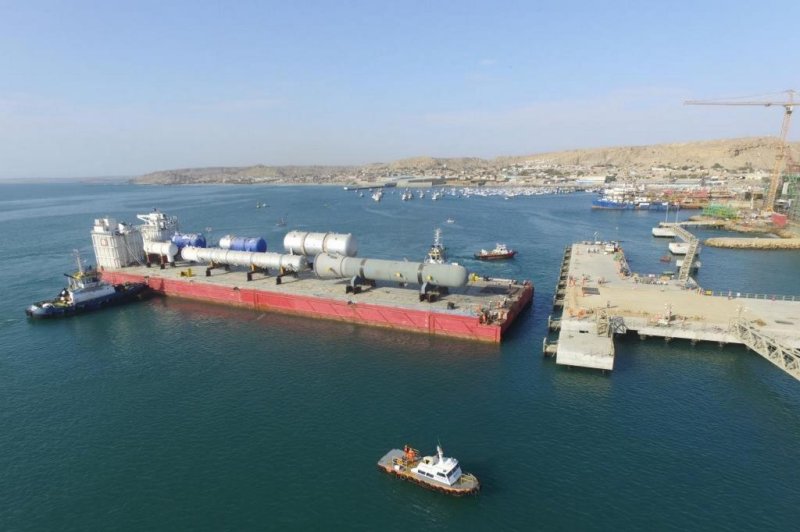A Peruvian state oil company said it has received $1.3 billion from lenders, in addition to $2 billion it previously obtained -- and that it still plans to borrow $600 million more -- as it pushes ahead with a controversial refinery project. Photo courtesy of Petroperu
Nov. 29 (UPI) -- The Peruvian state oil company said it has received $1.3 billion from lenders, in addition to $2 billion it previously obtained -- and that it still plans to borrow $600 million more -- as it pushes ahead with a controversial project with costs that have soared from original estimates.
Petroperu received the 10-year, $1.3 billion loan from a Spanish lending agency that helps promote exports from that country and plans to repay it at a 4 percent annual rate after completing the Talara refinery upgrade in 2021, according to a Wednesday press release. Spanish companies were selected to carry the project.
This borrowing follows $2 billion obtained in June of last year, when the company sold bonds worth $1 billion to be repaid in 15 years and another $1 billion to be repaid in 30 years.
"During 2019 we will evaluate alternatives to complete the pending financing of about $600 million," the company said.
The project, which Petroperu says carries a $5 billion price tag, aims to upgrade capacity of the Talara refinery, the biggest one owned by the state oil company.
The benefits are questionable because it is located in the north of the country, 630 miles away from the country's biggest fuel market. It was built there at a time when Peru was obtaining crude oil from Amazon fields it owned, but no longer owns, and where heavy crude output has sharply declined.
The upgrade includes plans to increase its crude running capacity from the current 62,000 barrels per day to about 95,000 barrels per day, as well as to add units to process heavier crude oil grades.
Petroperu does not own a network of fuel stations, nor any oil production field. It owns about 85,000 barrels per day in refining capacity, including Talara, with a small refinery near Lima and others in the Amazon. It used to own offshore and onshore fields but those were sold and it has since bought locally and imported crude oil to process.
The company also owns a pipeline that transports crude oil from the Amazon, and where multiple leak incidents have occurred in recent years that the company has blamed on sabotage. Indigenous and human rights groups have on the other hand complained about pollution caused by lack of proper maintenance.
Petroperu, created in the late 1960s after the nationalization of oil assets, was much bigger at one point, but most of its assets were sold in the 1990s.
La Pampilla refinery, with a 102,000-barrel capacity, and located in Lima, by far the best market in the country as it is near the airport and next to a city of 10 million people, was sold for about $180 million less than two decades ago. Spanish company Repsol bought the refinery, and owns a network of service stations in the capital, in addition to hydrocarbon production assets.
When the project in Talara was first announced in 2007 at well under $1 billion, the project made more sense because at the time a private company had plans to produce heavy crude oil in the Amazon. There were plans at the time to bring production through Petroperu's pipeline to Talara, but the project was not carried out as crude oil prices that had been high around that time declined.
Perenco, a company that has 50 percent rights to a field in the Peruvian Amazon that has reserves for an estimated 200 million barrels of 2P reserves of very heavy crude oil, has delayed an ambitious, large-scale heavy crude production project amid volatile prices. Its website lists only 1,000 barrels of oil equivalent production per day in the area, as of 2015. The area is accessible only through river barges.
The heavy crude project that was supposed to feed Talara with heavy crudes is also controversial as it is located in the middle of the rainforest, where native populations have already suffered the consequences of oil pollution from Petroperu-owned pipeline spills.
Peruvian lawyer Wilber Medina started a legal proceeding to stop the $5 billion refinery upgrade project claiming costs had surged over $4 billion from the original plans without justification, the Gestion newspaper reported in January.
Medina questioned how will Petroperu, with its limited assets, be able to pay back the loans. He warned Peru's population of about 30 million would eventually have to pay higher fuel costs in coming decades to help repay the loans, and complained of an inefficient state bureaucracy.
The Peruvian comptroller's office also issued a report warning about soaring costs for the project compared with the original plans, Gestion newspaper reported in 2017.















